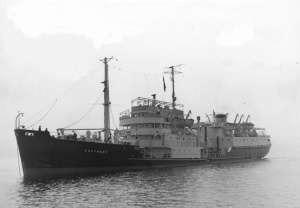Eddy-class coastal tanker (1953)
 | |
| Class overview | |
|---|---|
| Name: | Eddy-class coastal tanker |
| Operators: |
|
| In commission: | 1951-1981 |
| Planned: | 10 |
| Completed: | 8 |
| Cancelled: | 2 |
| Retired: | 8 |
| General characteristics | |
| Type: | Tanker |
| Tonnage: | 2,200 long tons deadweight (DWT) |
| Length: | 286 ft 5 in (87.3 m) |
| Beam: | 46 ft 4 in (14.1 m) |
| Draft: | 17 ft 3.5 in (5.3 m) |
| Propulsion: | 3-cylinder triple expansion steam engine |
| Speed: | 12 knots (22 km/h; 14 mph) |
The Eddy-class coastal tankers were Royal Fleet Auxiliary Replenishment oilers built from 1951-1953 tasked with transporting and providing fuel and other liquids to Royal Navy vessels and stations around the world. There were originally ten ships planned in the class, although the final two were cancelled in 1952. Originally designed to act as fleet attendant oilers, in this role the ships were obsolete almost as soon as they were built due to the increasing prevalence of replenishment at sea, and their role was refocused to coastal transport duties.
Most of the class had relatively short service careers, although Eddyfirth remained in service until 1981. Several of the vessels were based at Gibraltar in the Mediterranean for most of their service years.
Ships
| Name | Pennant | Builder | Laid down | Launched | Commissioned | Decommissioned |
|---|---|---|---|---|---|---|
| Eddybeach | A132 | 20 March 1950 | 24 May 1951 | 8 December 1951 | 27 May 1962 | |
| Eddybay | A107 | 23 March 1951 | 29 November 1951 | 25 April 1952 | 9 November 1962 | |
| Eddycliff | A190 | 25 August 1952 | 10 February 1953 | August 1963 | ||
| Eddycreek | A258 | 19 January 1953 | 11 September 1953 | 25 July 1960 | ||
| Eddyrock | A198 | 16 December 1952 | 7 June 1953 | March 1967 | ||
| Eddyreef | A202 | Caledon Shipbuilding Co., Dundee | 28 May 1953 | 23 October 1953 | 1958 | |
| Eddyfirth | A261 | 28 April 1952 | 10 September 1953 | 25 April 1954 | April 1981 | |
| Eddyness | A295 | 22 October 1953 | 11 October 1954 | 29 January 1963 | ||
| Eddycove | cancelled 1952 | |||||
| Eddymull | cancelled 1952 | |||||